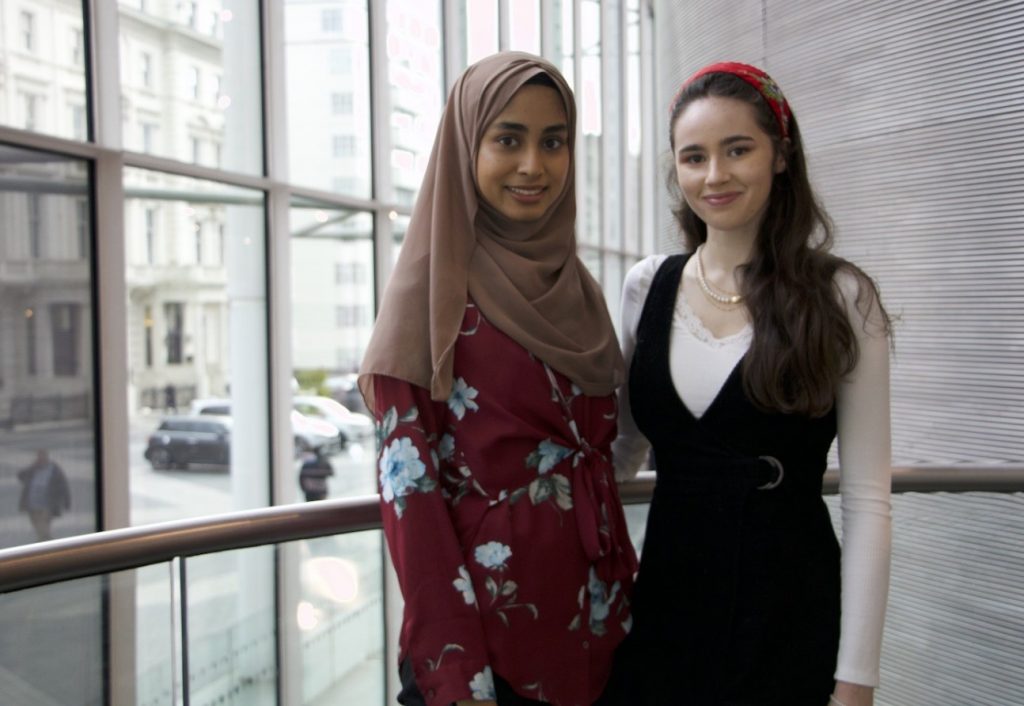
Almost three months ago, the Institute of Global Health Innovation held the final of their 9th annual Health Innovation Prize, a competition searching for the next generation of innovators in health.
Out of 46 applications received from students representing 13 UK universities, five ideas reached the final. After pitching their projects to the judges, team Calidiscope, who are designing a mattress topper to detect pressure sores, took home the top prize of £10,000. Behind the winning idea is Luthfun Nessa, a final year medical student at Cardiff University. She created the idea with co-project lead Anna McGovern.
The two met while studying at Imperial College London. Luthfun joined Imperial for a year as part of her intercalated degree, while Anna was doing her postgraduate degree in Biomedical Engineering. Luthfun had ambitions to be an entrepreneur in healthcare but wasn’t sure how to get started.
“When I was a lot younger, I had this desire to establish a business, but this initially disappeared from my mind when I started studying medicine,” she says. “While I was at Imperial, I did a module called Medical Device Entrepreneurship. That module inspired me to want to create a start-up, even though I didn’t have an idea at the time.”
Providing an alternative to old fashioned solutions
Luthfun and Anna first came up with their project at an Imperial Enterprise Lab Ideation Masterclass. The event helps students analyse global challenges and develop potential start-up ideas to address them.
“This really opened my eyes to the world of start-ups,” says Luthfun.
The pair chose to focus their start-up on pressure sores. Also known as pressure ulcers or bedsores, these are injuries to the skin and underlying tissue, caused by prolonged pressure that cuts off the blood supply to an area of skin. Pressure sores usually affect people who are confined to a bed for long periods of time.
These sores are estimated to occur in 4–10% of patients admitted to hospitals in the UK. According to Public Health England, risk of death rises by five times in older people who have pressure ulcers. However, the majority of cases are avoidable.
The Health Innovation Prize winners found that treatment for these injuries needed improvement.
“On a summer project, I followed around a surgeon who was working with people who had infected wounds,” says Luthfun.
“I couldn’t understand why the management of wounds was so archaic, old fashioned and inefficient as patients were having quite bad outcomes.”
According to Luthfun, innovations for treating pressure sores have also lacked effectiveness.
“I knew from personal experience of working in the hospital that there wasn’t much innovation in treating pressure ulcers,” she says.
“I would see nurses bandaging using vacuum dressing. These are old fashioned methods that are still being used.
“The alternatives on the markets include beds that ease pressure sores, but these are too expensive for the NHS. Foam mattresses also aren’t very effective.”
These experiences prompted the pair to carry out further research, which ultimately led them to develop their mattress topper which integrates novel sensors and machine learning to reduce the incidence of pressure ulcers. Their innovation measures a key marker of inflammation to enable earlier detection and therefore intervention, for example repositioning the person to prevent the sores from developing.
Developing the mattress topper
Calidiscope has been through a long journey to get their mattress topper to where it is now. Attending the Ideation Masterclass led them to submitting their idea to Imperial Enterprise Lab’s WE Innovate. This was the team’s first taste of entering their idea into a competition.
To prepare for the event, the founders spoke to nurses and patients to determine what was needed in an effective solution. Luthfun and Anna earned £2,000 for their idea from WE Innovate. This helped them build a hand-sized prototype and one that was seat-sized.
The next step for the pair has been to create a flexible, comfortable prototype that can fit in a hospital bed. This has perhaps been one of the most challenging parts of their journey.
“We need something that people can comfortably sleep on. It has taken a lot longer to create our prototype because it was more novel than we anticipated. Hiring an electrical engineer would have been quicker, but we didn’t have the funds,” says Luthfun.

Calidiscope submitted their idea to more competitions. As well as impressing judges at IGHI’s Health Innovation Prize, this year they also won £30,500 at Imperial’s Venture Catalyst Challenge. They were also semi-finalists at last year’s Mayor’s Entrepreneur Programme. The funds they’ve won will now be used to create a full-size prototype with the help of an electrical engineer who will design and build the device.
Developing a full-sized prototype will help the innovators to move towards running various tests on the topper. In the future, they hope to apply for the intellectual property of their product.
“A lot of sacrifices”
Establishing a start-up while being a student and juggling other commitments hasn’t been easy for Luthfun. But she has utilised the spare time effectively:
“My time dedicated to the start-up changes throughout the year, depending on what’s looming. Lockdown has given me more free time to work on the start-up.”
Luthfun is refreshingly honest about what it takes to build a start-up, with some valuable advice for students who want to become entrepreneurs:
“Be prepared to make a lot of sacrifices. It isn’t as glamourous as it seems. There will be a lot of hard work and ups and downs involved. We initially didn’t do well in competitions. But perseverance and knowing what you want from life is important to launching a successful start-up.”